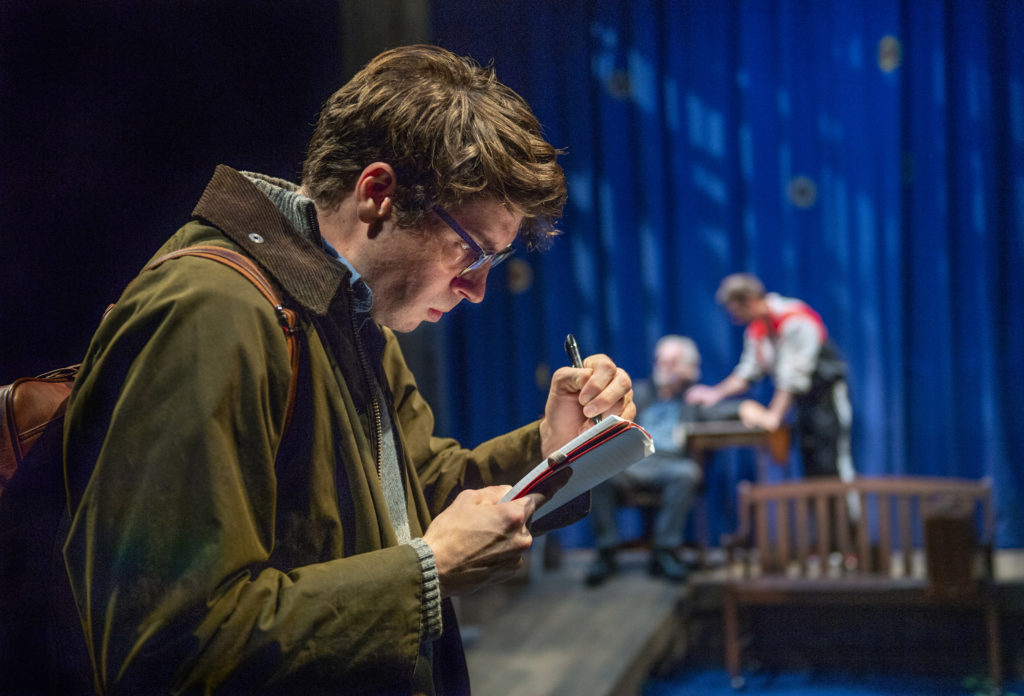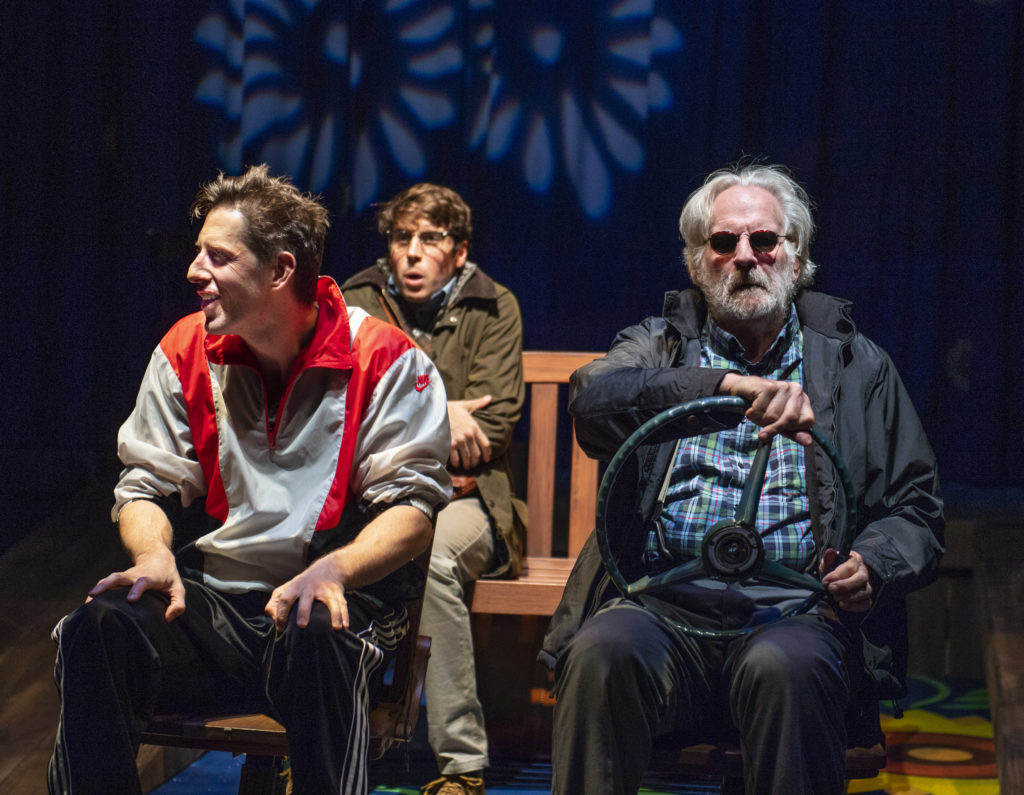
Odd to say about a play that touches on the Holocaust, but with its poignant take on family, fiction and hope for the future, “Everything Is Illuminated” offers a lovely welcome to the holiday season. At the Aurora Theatre through December 16, this warm cookie of a show is a little nutty, loaded with bittersweet morsels and misshapen in a way that only adds to its homey authenticity.
Playwright Simon Block’s quirky, multi-textured adaptation of Jonathan Safran Foer’s bestselling novel braids three narrative strands. The most prominent takes the form of a largely comedic road trip. Twentyish Jonathan (Jeremy Kahn)—a character based on the novelist—travels to Ukraine, searching for a woman who decades earlier helped his grandfather flee their small village and escape the Nazis. He’s also trying to write a chronicle of his family’s history; through which, the audience senses, he hopes to understand his own place in the scheme of the world.
Jonathan is guided on his Ukrainian journey by Alex (Adam Burch. a lanky, larky delight)—a local young man whose mangled English, perpetual horniness and uncritical adoration of all things American provides much of the show’s humor. Also along for the ride is Alex’s grandfather, played by Julian López-Morillas in a sterling performance that persuasively evolves from curmudgeonly to cruel to compassionate. Burch, too, believably reveals unexpected facets of his character over the course of the evening.
The heart of the play is its second story, told mainly through anecdotes recollected by Alex’s grandfather and an elderly village woman (Lura Dulas, delicately compelling) who Jonathan desperately hopes will prove to be his own grandpa’s one-time savior. Emotional pain throbs through the older characters’ dredging of long-smothered memories in these scenes, making what could easily have been the play’s most prosaic moments into its most dramatic.

“Everything Is Illuminated”‘s thinnest strand is a series of occasional vignettes intended to show Jonathan’s wordplay-besotted creative process. He draws on both his Ukrainian journey and his imagination to piece together a folklorically stylized version of his family lineage. We see him scribble in his notebook, narrating tales and engaging in dialogues with characters he concocts in an effort to bridge the enormous gaps in his sparse factual knowledge.
While playwright Block doesn’t get many narrative dividends out of this third track, director Tom Ross—with keen support from designers Kurt Landisman (lighting), Kendra Jackson (masks), and Matt Stines (sound); and fifth cast member Marissa Kettle (in several tiny but finely-etched roles)—smartly elevates its brief scenes into a lovely Chagall-evocative ornamentation. They leaven the play’s heavier elements and, in their echoes and contradictions of its other sections, remind us that “Everything Is Illuminated” is, above all, about the simultaneously truth-obscuring and wish-fulfilling power of storytelling.
Scenic designer Kate Boyd enhances this motif with her simple-yet-fanciful set of the old woman’s crooked-doored, artifact-packed house, which looks lifted from the pages of a children’s book. And props master Eric Johnson invites the audience to project its imagination just like Jonathan does, with rolling chairs cleverly choreographed to stand in for a car.
While Julian López-Morillas and Adam Burch convincingly show us their characters’ evolution, Jeremy Kahn succeeds at a particularly challenging task in the role of Jonathan Safran Foer. He’s the only actor required to hopscotch meta-fictional conceits from the source novel that Block has ambitiously, though a bit clumsily, adapted to the stage. Audiences are bound to be a bit puzzled about the lead character’s point-of-view when the playbill cover features the words “Jonathan Safran Foer’s” as prominently as “Everything Is Illuminated”.
But, impressively, everything isn’t convoluted. In the first scene, as Jonathan starts out on his trip, Kahn’s physical presence and locution both feel a bit formal, stiff, as if he’s cautiously tiptoeing into his own story, half-narrating, half-playing his action. This seems an intentional choice by Kahn and director Ross, because as the play proceeds, Kahn relaxes into the onstage character, Jonathan’s self-consciousness only evident in those scenes when he’s trying to write.
Formality—accompanied by a sense of hard-won confidence—returns in the play’s final scene, in which Jonathan, having transformed his experience into a novel, stands before the audience and reads a whimsical, soul-stirring passage from his book.
With a deep affection for yarn-spinning, a plea for compassion—both familial and global, and an oddly appealing pinch of awkwardness, “Everything Is Illuminated” makes for first-rate holiday fare.
Originally published in the Bay Area Reporter
